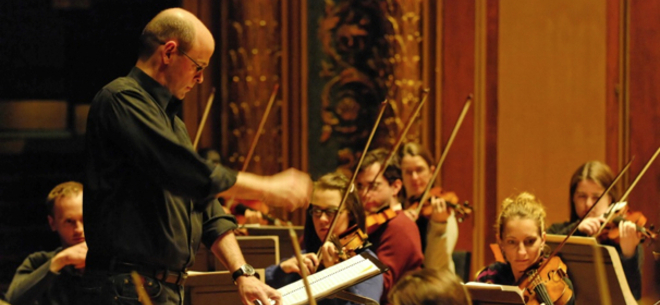The Boston Modern Orchestra Project works to redefine classical music

With public interest in classical music dwindling, the Boston Modern Orchestra Project aims to step outside the Beethoven box. Founder and conductor Gil Rose chatted with us about the goals of the BMOP, the challenges the organization faces within the Boston music scene, and the recent release of two new self-published recordings: Milton Babbitt’s All Set and George Antheil’s Ballet Mecanique. See the BMOC in action on March 28 at the Boston Connection concert.
How do you get contemporary audiences excited about classical music? I think the general public doesn’t have a clear understanding that there are probably more composers writing composed music, or “classical music” — which is sort of bad terminology — alive today than there ever were in history. And that’s the real difference between the general public and the compositional musical art wall. One of our goals is to represent and show the repertoire of music that’s been made over the last 100 years, the variety and kaleidoscope of different styles and movements as much as we can. We’re making the public more aware of a continuing, living tradition of classical composition.
How does the BMOP fit into the Boston music scene? There are several orchestras in town, but they all play what I call the music of “dead white European males.” … We strive toward representing the gamut of all the musical expression that’s written out there in the orchestral format. I’m pretty much the only person who figured out that was the missing piece, because there’s really no other institution like BMOP that survives in any other city. We’re the largest music non-profit, as far as performing institutions go, and I have a very aggressive agenda to perform and record music that the majority of the general public is not even aware of.
Are your audiences typically established classical music lovers/students of music? Or are there a lot of people who have never been to a classical music performance? It’s a little bit of everything. Often we are committed to a wide variety of repertoire, and different styles. We have several opportunities for some concerts under certain thematic umbrellas, and we’ve had concerts that used high-tech, or concerts that we involved in exploring indigenous influences from Asia in modern concert music. Those kinds of thematic concerts bring certain thematic audiences, and sometimes those audiences stay as part of our general audience and sometimes we change them up for a new thematic audience. Audiences are shrinking for even well-established, more mainstream organizations all over the place. It’s a challenge, and it’s one of the reasons we started our own record label, because we wanted to be able to disseminate what we thought was an important repertoire. We’re actually a rather small non-profit but we self-produce more recordings than any other orchestra in the world.
One of the techniques used in Milton Babbitt’s work is 12-step serialism, which seems to be an acquired taste in the music world. What’s your relationship with it? That was a very specific faction or school of compositional thought in the 20th century. It has its critics and it has its admirers. It’s an extreme technique in writing. It’s something that always interested me. I think it’s important for the orchestra and the record label to represent all the various important movements that occur in the modern era, including, in that case, serialism. This is one particular school of thought and the institution doesn’t advocate any one kid of representation, so we try to tick them all off with some conviction and expertise. So that’s where that CD comes from. It was a notch in my belt that I wanted to put on.
What’s next for you and for the Boston Modern Orchestra Project? Oh, I don’t know. We’re kind of making it up as we go along! Next year will be our 19th season, and the year after that will be our 20th, so we’re trying to think up some showy, big things to do. It’s a tough economy to raise money for something like that, but we’re pretty famous, in a sense. We have fans from all over the world because we have a very unique mission. It’s a joy to get up every day and know that you contributed something that no one else is doing. I may sometimes record the wrong symphonies, but at least it’s not something that’s been done 50 times. Doing stuff like Ballet Mecanique contributes to the public musical knowledge.
Are there any plans to expand BMOP to different cities? It’s something I’ve thought about a lot. It does create some acronym problems — in St. Louis it would be “SLOP” (laughs). But there’s a conversation going on about that right now, and … maybe! I have a hard enough time keeping everything together running one of them; I can’t imagine running two.


 BMOP: Boston ConNECtion
BMOP: Boston ConNECtion